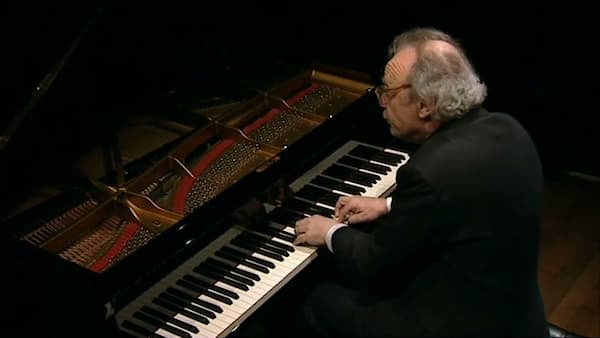by Georg Predota
Crafting Musical Narratives

Alfred Brendel
His performances were not just concerts but profound dialogues with the music, marked by a clarity that seemed to illuminate the very architecture of each composition. Audiences didn’t come for the man, they came for the music.
Alfred Brendel’s virtuosity was undeniable, but it was never about showmanship. Every note he played was rich and expressive, never indulgent and his interpretations commanding, yet free of pretension. Brendel’s performances were masterfully shaped, each one a journey with a clear sense of purpose.
But what truly set him apart were the countless subtle decisions, his phrasing, the contrasts he drew, the delicate shifts in tone. He never raced through a piece, yet the sheer depth of detail he revealed made it feel as though the listener was constantly discovering something new, moment by moment.
Revelatory Art
Brendel made the familiar seem revelatory. In his performances of Beethoven, according to a critic, he projected “an X-ray picture of each sonata onto a screen,” revealing the inner workings of the music with surgical precision yet profound emotion.
This intellectual approach earned him the moniker of the “philosopher’s pianist,” a title he wore with pride but also with a characteristic twinkle of self-awareness. Brendel himself once remarked, “The word LISTEN contains the same letters as the word SILENT,” a pithy encapsulation of his belief that true musical understanding begins with attentive stillness.
Pianists across generations have cited Brendel as a beacon of inspiration. Mitsuko Uchida, the renowned Japanese-British pianist, praised his ability to balance structure and spontaneity. “Alfred had this extraordinary gift of making every note speak, yet never losing the thread of the composer’s thought. His Beethoven was like a conversation with the divine, rigorous, yet utterly human.”
Uchida’s words echo the sentiment of many who saw Brendel’s performances as a masterclass in musical storytelling, where technical brilliance served the purpose of uncovering the philosophical underpinnings of the score.
Blending Intellect and Artistry

Alfred Brendel
Brendel’s influence extended beyond the stage through his erudite writings. His essays, collected in a number of books, are celebrated for their wit and insight. His former student Till Fellner wrote, “His words were as illuminating as his playing. He taught us that to play Schubert is to suspend gravity, to let the music float in a dreamlike state.”
His approach was not without its detractors. Some found his meticulous style too cerebral, lacking the fiery abandon of other postwar titans. Yet even those critics acknowledged his unmatched ability to reveal the music’s inner logic. Pianist András Schiff, reflecting on Brendel’s legacy, noted, “He showed us that intellect and emotion are not opposites but partners. His Mozart was playful yet profound, like a poet who knows when to smile.”
Brendel’s life was as rich as his music. Raised in Zagreb and later based in London, he was a polymath who could have excelled as a poet, painter, or author. His lectures and masterclasses were legendary, filled with anecdotes delivered with a dry wit that disarmed audiences.
Pianist Imogen Cooper recalled, “I once attended a masterclass where he spent 20 minutes on a single phrase in Beethoven, dissecting it with the precision of a surgeon and the passion of a poet. We were all spellbound.”
Profound Legacy
His recordings remain benchmarks, yet he remained humble and emphasised the music over the performance. “Self-discovery is a slower process but a more natural one,” he wrote, a reflection that applied as much to his own career as to his advice for young pianists.
Alfred Brendel had the ability to make the music feel both timeless and immediate, as each performance was an act of discovery. Yet, his legacy is not just in the notes he played but in the ideas he championed.
For Brendel, music was a journey of the mind and heart, that listening demands silence, and that grace is a form of strength. As Richard Morrison wrote, “Brendel’s encounters with music were transformative, not just for him but for all who listened.”
In an age of distraction, Brendel’s legacy invites us to slow down, to truly listen, and to seek depth over spectacle. Through his playing and his writing, he offered not just sound but insight, essentially a voice of enduring clarity that will resonate through generations.
No comments:
Post a Comment